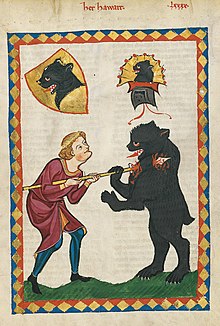Hawart

Hawart (fl. 13th century) was a
The identity of the poet named Hawart is uncertain. In the 19th century he was identified with the Tyrolean knight Hawart von Antholz.[3] More recently he has been identified with Johannes Hawart the Elder of Strasbourg, who is mentioned in texts of 1289 and 1292 and died in 1302 in old age.[2]
Where in
Hawart wrote a Tagelied (dawn song) about the parting of lovers who spent the night together with the coming of dawn:[3]
Nu kiuse ich an der vogel swigen |
I feel in the repose of birds |
References
- ^ Wilhelm Wilmanns (1880), "Hawart", Allgemeine Deutsche Biographie (in German), vol. 11, Leipzig: Duncker & Humblot, p. 119.
- ^ a b c Reinhard Bleck (1987), "Ein oberrheinischer Palästina-Kreuzzug 1267", Basler Zeitschrift für Geschichte und Altertumskunde, 87: 5–27.
- ^ a b Abdulwahid Lu'lu'a (2013), Arabic-Andalusian Poetry and the Rise of the European Love-Lyric, Strategic Book Publishing, pp. 291–293.
Further reading
- Bleck, Reinhard (1984). "Versuch einer Datierung und Lokalisierung von Hawarts Kreuzzugsliedern". In Alfred Ebenbauer (ed.). Philologische Untersuchungen, gewidmet Elfriede Stutz zum 65. Geburtstag. Philologica Germanica 7. Vienna. pp. 79–89.
{{cite book}}: CS1 maint: location missing publisher (link)
